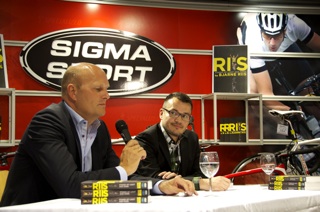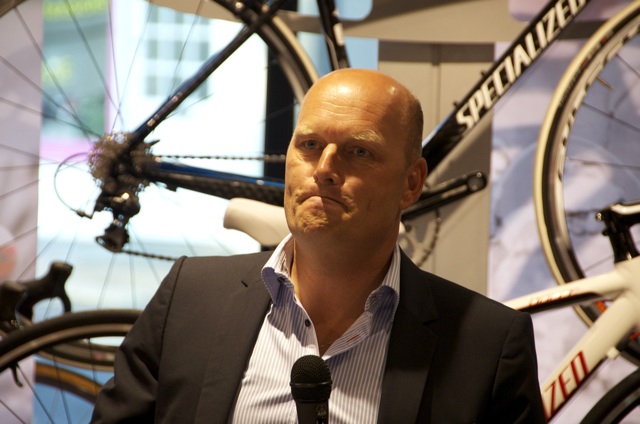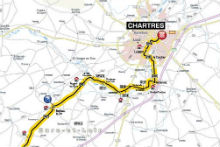Bjarne Riis, who famously admitted to doping eleven years after winning the 1996 Tour de France, has said he would not have been able to write his autobiography without his public confession.

The Dane, who now manages the SaxoBank team, described his erstwhile team leader, Alberto Contador, currently serving a doping ban, as the most talented rider he has ever seen.
And with the Spaniard prevented from riding this year’s Tour de France, Riis said SaxoBank’s tactic in this year’s race would be to “create possibilities, take chances, and tease the other teams”.
Riis’ autobiography, Stages of Light and Dark, describes his use of performance enhancing drugs.
He told an audience of press and public at London’s Sigma Sport on Wednesday (30) of his gradual immersion in the culture of doping.
Riis recalled injecting vitamins for the first time. “I sat there for hours and I couldn’t do it,” he said.
“That’s the first step to maybe something else. That’s a very hard decision and a decision that can change your life forever. Who knows. It did for me.
“At the time you think about it, and it’s hard, but you don’t reflect on it because you think it’s a part of that life, it’s a part of the culture, everyone else is doing it.
“After a while you think it’s just natural.”
He added that only after it was too late had he come to the realisation that his actions were wrong.
Earlier this year, Riis witnessed the banning of Contador by the Court of Arbitration for Sport for a failed doping test given at the 2010 Tour de France. The Spaniard was subsequently stripped of his overall victory in that race and his 2011 Giro d’Italia title.

Riis backed Contador, and said he hoped the Spaniard would be riding for his team in this year’s Vuelta a Espana when his suspension expires in August. He praised Contador’s abilities, placing him at the pinnacle of the riders he has managed against whom he competed.
“He can do anything: climbing, time trialing – he has everything,” Riis said.
“Very often, the word ‘talent’ is discussed: ‘Who is the biggest talent? What is the biggest talent you can have?’
“In my opinion, will power is maybe the biggest talent you can have. It’s not enough to have a big physical talent: you need will power, and he has that too.”
“He is an exciting rider to watch: he can’t sit still. He’s moving all the time, he wants to attack, and to decide the race wherever he can.”
Carlos Sastre’s overall victory in the 2008 Tour de France, and Nick Nuyens’ triumph in last year’s Tour of Flanders were identified by Riis among the highlights of his career in management.
The loss of riders like the Schleck brothers to rival teams was a sad but inevitable part of management, he admitted, but spoke with obvious pride at his association with riders that included Olympic time trial champion, Fabian Cancellara.
“Being behind Fabian in a time trial is something very, very special. Everyone knows his talent, but it’s art when you look at him and his technique; not just in the corners but the way he rides. Alberto, to see him flying over the climbs, it’s fantastic,” he said.
During the early stages of his career, Riis rode as a domestique for two-time Tour de France winner, Lauren Fignon. He described Fignon as a great leader and the Frenchman’s loss of the 1989 Tour by eight seconds to Greg Lemond as a day he would never forget.
He criticised the UCI’s attempts to ban race radio and regulations from the governing body that prevented professional cyclists from using equipment available to amateurs.
The ‘chaingate’ affair of the 2010 Tour de France, in which Contador, then riding for Astana, attacked Riis’ own rider, Andy Schleck, while the Luxembourger suffered a mechanical, had not altered the out come of the race, he said.
Riis’ career ended in 1999 with a crash at the Tour of Switzerland in which he broke his elbow. He said he had already made the descision to retire and had told his directuer sportif, Walter Goodefroot, that he would not ride that year’s Tour.
Pictures by Roz at On The Road Cycling Tours




